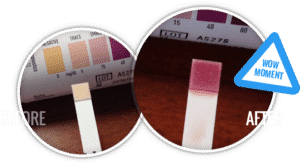It’s important to understand the difference when it comes to testing ketone levels.
Our blood or urine can both be used when testing ketone levels. With one method being more superior than the other.
Urinary testing is the easiest method and is most common. However, when our body becomes more accustomed and efficient in absorbing the ketones, less and less will be eliminated through the urine. This can give the illusion on the urine test strip that you are not producing or taking a sufficient amount of ketones. Keep in mind, this doesn’t mean that your body hasn’t absorbed or made use of those ketones.
At present, urine ketone test strips cost about $1.50 to $2.00 each.

The preferential method to testing ketone levels is through the blood. Ketone blood testing should be done within one hour of taking the exogenous ketones. This is the most accurate way to determine how high the level of ketones are, and how much your body has absorbed. At present, testing ketone levels through the blood is the most expensive alternative. At your next doctor visit, if you are having other lab work done, you could ask your doctor to include a ketone level.
Is ketone testing necessary? Probably not, but the tests could provide positive reinforcement that you are raising your ketone level and burning fat. If you are seeing positive results via the many benefits of taking ketones, then you most likely won’t ever need to monitor your ketone levels that closely.

